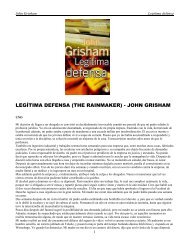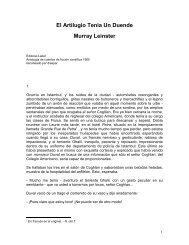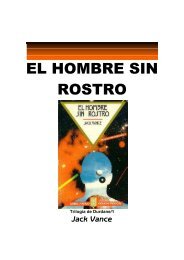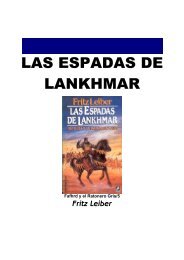- Page 3 and 4:
technically referred only to the dr
- Page 5 and 6:
esulting conversations were beyond
- Page 7 and 8:
He’d better go wake Driscoll, the
- Page 9 and 10:
most of the programmers, but despit
- Page 11 and 12:
“Carrier fix. We’re rolling.”
- Page 13 and 14:
The camera continued to pan. She co
- Page 15 and 16:
ERTS took Out term life insurance p
- Page 17 and 18:
imagery alone amounted to more than
- Page 19 and 20:
“I’m not buying that image,”
- Page 21 and 22:
From the main data room, Karen Ross
- Page 23 and 24:
going to scream—sending an untrie
- Page 25 and 26:
“Oh, yes . . .“ The voice remai
- Page 27 and 28:
This seemed so self-evident that fo
- Page 29 and 30:
Peter Elliot’s difficulties began
- Page 31 and 32:
4. The dreams are the first sign of
- Page 33 and 34:
their search for clues, although wh
- Page 35 and 36:
PETER ELLIOT REMEMBERED JUNE 14, 19
- Page 37 and 38:
Over the years, scientists had evol
- Page 39 and 40:
“Does she understand the experime
- Page 41 and 42:
covered with Amy’s finger paintin
- Page 43 and 44:
known about the Congo. The ancient
- Page 45 and 46:
Africa was not thoroughly explored
- Page 47 and 48:
Apparently it never occurred to Ell
- Page 49 and 50:
“Hello, Amy,” Karen Ross said,
- Page 51 and 52:
Amy stopped shredding. In her world
- Page 53 and 54:
Houston to San Francisco that after
- Page 55 and 56:
“Expedition electronic expert,”
- Page 57 and 58:
Pearl predicted that fieldwork woul
- Page 59 and 60:
with computerized equipment, the ac
- Page 61 and 62:
The rain forests of the world had t
- Page 63 and 64:
“That’s ground truth,” Ross s
- Page 65 and 66:
“Just do it,” Elliot said.“Ca
- Page 67 and 68:
GOVERNMENT DISPATCHED GENERAL MUGUR
- Page 69 and 70:
Rogers nodded. “We’ve got a dil
- Page 71 and 72:
Water was heavy: seven-tenths of hu
- Page 73 and 74:
Apparently, Captain Munro found hum
- Page 75 and 76:
The song of the muezzin floated ove
- Page 77 and 78:
“Point of origin? In the middle o
- Page 79 and 80:
“Oh, no,” Munro said. “That w
- Page 81 and 82:
June 16,19791. TimelineIT WAS FARTH
- Page 83 and 84:
quantities specified: the contracto
- Page 85 and 86:
Even further, Rumbaugh anticipated
- Page 87 and 88:
2. Piggyback SlurpTRAVIS FELT LIKE
- Page 89 and 90:
The screen printed out numbers for
- Page 91 and 92:
“It’s something new,” Seamans
- Page 93 and 94:
Apparently the aircraft made an uns
- Page 95 and 96:
“You’ve hurt her feelings,” E
- Page 97 and 98:
“Twenty-four hours!” Ross said,
- Page 99 and 100:
“Let me tell you something,” Ro
- Page 101 and 102:
“Oh,” Ross said.She crossed the
- Page 103 and 104:
The computer ran through possible e
- Page 105 and 106:
were in constant motion as men tran
- Page 107 and 108:
During the sixteen hours following
- Page 109 and 110:
“I’ll take care of Amy,” Munr
- Page 111 and 112:
At seven in the morning, they flew
- Page 113 and 114:
evolution, Elliot could see the foi
- Page 115 and 116:
But that was before the Zaire army
- Page 117 and 118:
“Amy will be fine,” Munro said
- Page 119 and 120:
For an instant he thought he had hi
- Page 121 and 122:
It was like being in the middle of
- Page 123 and 124:
Munro squinted at the departing cra
- Page 125 and 126:
natives often come aboard with tusk
- Page 127 and 128:
“expunge the embarrassment” of
- Page 129 and 130:
produced a small silver unit, the s
- Page 131 and 132:
Their original plan had called for
- Page 133 and 134:
He had also expected the jungle to
- Page 135 and 136:
Amy never strayed far from the grou
- Page 137 and 138:
“Yes, we are real brothers. But w
- Page 139 and 140:
“He says a white man is dead in t
- Page 141 and 142:
centuries before. More than four th
- Page 143 and 144: Two HOURS LATER, THEY WERE REUNITED
- Page 145 and 146: Ragora Gorge, a limestone cut two h
- Page 147 and 148: this three or four times in all the
- Page 149 and 150: mosquitoes in the midst of the roar
- Page 151 and 152: allowed river fish and other creatu
- Page 153 and 154: And suddenly the front of the boat
- Page 155 and 156: ELLIOT SHIVERED, ZIPPED HIS PARKA T
- Page 157 and 158: the jungle. And if Ross’s calcula
- Page 159 and 160: Because the western slopes of Muken
- Page 161 and 162: COMPUTR HAS INSFSNT INFO IN AURL ME
- Page 163 and 164: much noise as possible, to frighten
- Page 165 and 166: “They didn’t get their damn sup
- Page 167 and 168: “No,” Elliot agreed. He glanced
- Page 169 and 170: Bad things.Obviously he would get n
- Page 171 and 172: Amy was gone.4. WEIRDHE COULD NOT B
- Page 173 and 174: With night goggles in place, the se
- Page 175 and 176: announced that this must be a post
- Page 177 and 178: favored elaborately decorated, colo
- Page 179 and 180: Ross called Elliot away from his di
- Page 181 and 182: The earlier transmitted conversatio
- Page 183 and 184: 1. ReturnTHE MORNING OF JUNE 22 WAS
- Page 185 and 186: They found Malawi’s body just out
- Page 187 and 188: organization of the human subject.
- Page 189 and 190: Gorillas nice to Amy?With a smug lo
- Page 191 and 192: He felt like crying.Peter good huma
- Page 193: 2. Missing ElementsELLIOT GOT ROSS
- Page 197 and 198: “Ask her,” Munro said, glancing
- Page 199 and 200: won’t know where the firing is co
- Page 201 and 202: DAY 11: ZINJJune 23, 19791. Gorilla
- Page 203 and 204: Certainly Peter Elliot would have d
- Page 205 and 206: Elliot was not convinced, and neith
- Page 207 and 208: “Because they’re not,” Elliot
- Page 209 and 210: During the evening, Elliot transmit
- Page 211 and 212: Amy agreed to lead them into the ju
- Page 213 and 214: Elliot said to Munro, “What do yo
- Page 215 and 216: occurred to me that the linguistic
- Page 217 and 218: Finally Elliot sat up on one elbow,
- Page 219 and 220: stood: she was treating him like he
- Page 221 and 222: calcium spectral lines but also the
- Page 223 and 224: No talk.“Amy understand thing tal
- Page 225 and 226: He gave three of the remaining port
- Page 227 and 228: COME .5459 .440GO .5378 .404SOUND C
- Page 229 and 230: Would the message be clear? Would t
- Page 231 and 232: they rushed into the compound, grun
- Page 233 and 234: 1. DiamondsIN THE MORNING A FINE LA
- Page 235 and 236: Munro had firsthand experience with
- Page 237 and 238: whatever minerals you were looking
- Page 239 and 240: electronics. And in the 1980s, “s
- Page 241 and 242: course of the conflict. If we decid
- Page 243 and 244: At that moment, Ross emerged from t
- Page 245 and 246:
PROJECT VULCAN was secret but Munro
- Page 247 and 248:
computer slang fur “can not estim
- Page 249 and 250:
and the first flashes of lightning
- Page 251 and 252:
THEY HAD NO FOOD, NO WATER, AND VER
- Page 253 and 254:
Dark ash on wings and fuselage made
- Page 255 and 256:
It was then the Kigani attack ended
- Page 257 and 258:
On October 1, 1979, R. B. Travis fo







